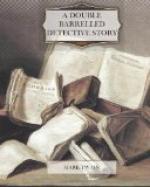“Here he is!”
It was true. Fifty yards down the gulch they had found him—that is, they had found a crushed and lifeless mass which represented him. Fetlock Jones hurried thither with the others and looked.
The inquest was a fifteen-minute affair. Ham Sandwich, foreman of the jury, handed up the verdict, which was phrased with a certain unstudied literary grace, and closed with this finding, to wit: that “deceased came to his death by his own act or some other person or persons unknown to this jury not leaving any family or similar effects behind but his cabin which was blown away and God have mercy on his soul amen.”
Then the impatient jury rejoined the main crowd, for the storm-center of interest was there—Sherlock Holmes. The miners stood silent and reverent in a half-circle, inclosing a large vacant space which included the front exposure of the site of the late premises. In this considerable space the Extraordinary Man was moving about, attended by his nephew with a lantern. With a tape he took measurements of the cabin site; of the distance from the wall of chaparral to the road; of the height of the chaparral bushes; also various other measurements. He gathered a rag here, a splinter there, and a pinch of earth yonder, inspected them profoundly, and preserved them. He took the “lay” of the place with a pocket-compass, allowing two seconds for magnetic variation. He took the time (Pacific) by his watch, correcting it for local time. He paced off the distance from the cabin site to the corpse, and corrected that for tidal differentiation. He took the altitude with a pocket-aneroid, and the temperature with a pocket-thermometer. Finally he said, with a stately bow:
“It is finished. Shall we return, gentlemen?”
He took up the line of march for the tavern, and the crowd fell into his wake, earnestly discussing and admiring the Extraordinary Man, and interlarding guesses as to the origin of the tragedy and who the author of it might he.
“My, but it’s grand luck having him here—hey, boys?” said Ferguson.
“It’s the biggest thing of the century,” said Ham Sandwich. “It ’ll go all over the world; you mark my words.”
“You bet!” said Jake Parker, the blacksmith. “It ’ll boom this camp. Ain’t it so, Wells-Fargo?”
“Well, as you want my opinion—if it’s any sign of how I think about it, I can tell you this: yesterday I was holding the Straight Flush claim at two dollars a foot; I’d like to see the man that can get it at sixteen to-day.”
“Right you are, Wells-Fargo! It’s the grandest luck a new camp ever struck. Say, did you see him collar them little rags and dirt and things? What an eye! He just can’t overlook a clue—’tain’t in him.”
“That’s so. And they wouldn’t mean a thing to anybody else; but to him, why, they’re just a book—large print at that.”
“Sure’s you’re born! Them odds and ends have got their little old secret, and they think there ain’t anybody can pull it; but, land! when he sets his grip there they’ve got to squeal, and don’t you forget it.”




